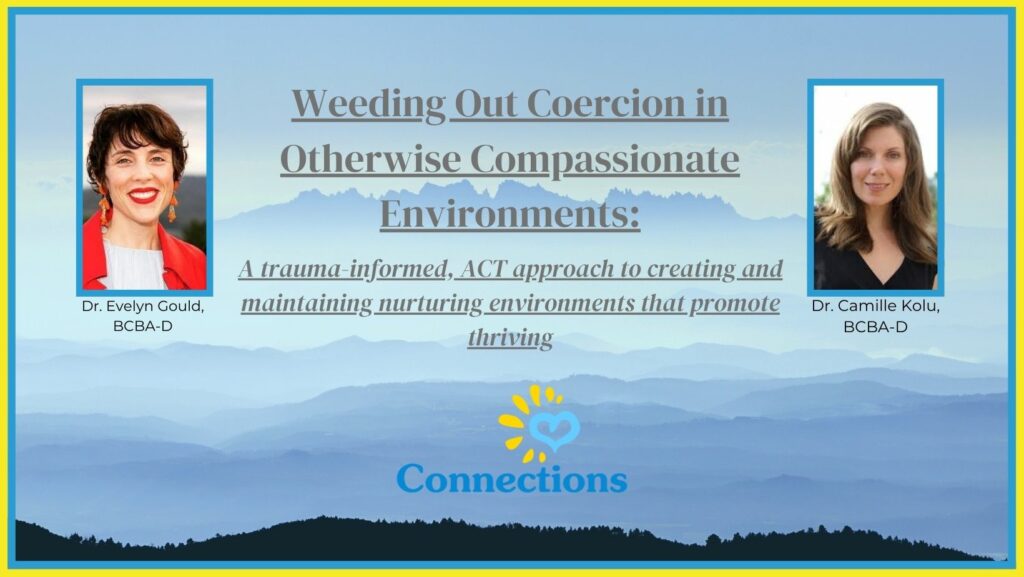Connections Behavior Planning and Intervention is excited to welcome Dr. Evelyn Gould and Dr. Camille Kolu for a Continuing Education webinar for Behavior Analysts!
Abstract
What if there were some practices you could try that cost nothing, are available to you at all times, and could change everything – for you, your practice, your team, your clients, your family, and your community? Our perspective is that ABA is a compassionate, relational, social-justice-oriented science, centered on promoting freedom from aversive control and establishing ‘contingencies of joy’ – whether that be with clients, families, students, groups or individual staff members and colleagues. Becoming a skilled and resilient behavior analyst thus requires context sensitivity; understanding our own and others behavior only in context (historical, cultural, relational, emotional, biological, etc). It also requires scanning for and reducing coercion (wherever it lurks!). Coercive contexts have physical, social, and emotional effects, increasing risk of stress-related mental health concerns and a wide variety of physical health problems (Dishion & Snyder, 2016). On the flipside, minimizing coercion thus influences a broad range of functioning, including reducing delinquency, increasing academic achievement, promoting generative behavior, reducing a wide range of behaviors of concern, and promoting mental and physical wellbeing. A wealth of research tells us that establishing nurturing relationships that foster appetitive control, promotes broad flexible classes of behavior that embody resilience, health and wellbeing (Biglan et al., 2012).
This training offers ideas, strategies, and tools for minimizing coercion and fostering appetitive environments that promote thriving – whether it’s your relationship with yourself that needs some caring, or the one you’re trying to foster with a client or their caregiver, or a relationship with a staff member or mentee, or any other relationship that matters to you. At its foundation, our work as behavior analysts requires each one of us to view ourselves as the context for promoting thriving (in ourselves and others). Come learn with us, as we discuss, model and practice context-sensitive strategies for growth, connection and meaning. We will explore how each of us can become a nurturing environment for others and ourselves.You will learn from an ACT and trauma-informed perspective as you dive into the messiness of human experience and try some screening, assessment, and intervention strategies that move you flexibly toward what matters.
About the Presenters:
Evelyn Gould, PhD, BCBA-D, LABA, is a Clinical Behavior Analyst and Licensed Psychologist from N. Ireland, currently residing in Los angeles CA, where she lives with her partner and 3 cats. Evelyn’s pronouns are she/they. Evelyn is a clinician, trainer and supervisor at The New England Center for OCD and Anxiety, an Assistant Clinical Professor at Keck School of Medicine at USC and a Research Associate in Psychiatry at Harvard Medical School. Evelyn has been providing clinical services to children, adults, and families for two decades, in addition to being engaged in applied research and scholarship. Evelyn has published peer-reviewed articles and book chapters on working with caregivers, clinical assessment and treatment, supervision and training, behavior analysis and ACT (Acceptance and Commitment Therapy). She is passionate about the dissemination of contextual behavioral science and addressing issues of diversity, equity and inclusion within and outside Behavior Analysis. Evelyn is a member of the LGBTQIA+ community and their work reflects personal and professional values of authenticity, compassion, social justice, and cultural humility. Evelyn strives to support and create affirmative and empowering spaces for all those she works with. Finally, Evelyn remains actively involved in a variety of Special Interest Groups, Task Forces and other volunteer groups within their professional and local communities.
See Dr. Gould’s other webinars here.
Dr. Camille Kolu is a behavioral scientist and BCBA-D in Denver, Colorado. She is the owner of Cusp Emergence, a private practice in which she joins families and agencies to engineer behavioral cusps for individuals and their loved ones. After training, supervision and work at the University of North Texas, Dr. Kolu earned a Ph.D. in Biopsychology and Behavioral Neuroscience at Rutgers University, where she developed neurobiological animal models of autism and examined olfactory and social contextual conditioning. Dr. Kolu practices behavior analysis across the lifespan with individuals and families affected by autism, foster care or adoption, mental illness, and/or developmental and intellectual disabilities. She partners with health and human service agencies, mental hospitals, schools, community centered boards, and the University of Colorado Denver, where she enjoys designing and teaching courses in behavior analysis and ethics. Dr. Kolu has published in peer-reviewed journals, and serves on the advisory board of the Cambridge Center for Behavioral Studies. She is active in local behavior analytic groups. Dr. Kolu explores research interests in verbal communities of reinforcement and stimulus schedules in the everyday interactions of families affected by disruption or trauma, while using her private practice to provide training, education, and behavior analytic mentorship and supervision.
See Dr. Kolu’s other webinars here.
Learning Objectives:
- Describe a “nurturing environment” from a behavior analytic perspective and discuss how the environment we create in the context of our work can promote or hinder the necessary components of nurturance and prosociality.
- Identify at least 3 literature-related strategies for assessing and addressing sources of aversive control and promoting appetitive control in contexts that matter for a client of your choosing
- Discuss the relationship between trauma-informed principles of care (such as safety and honoring relationships) and an ACT-consistent perspective on promoting thriving and resilience even in the most aversive contexts.
BACB CEU’s included, and Cost to Attend:
- 1.5 Learning CEU (Ethics)
- $29.99 (CEU’s included in price)
For questions, challenges with registration, or any other needed information, please contact Dusty, Director of Continuing Education and ACE Coordinator for CBPI, LLC, at continuingeducation@connections-behavior.com.
Connections Behavior Planning & Intervention, LLC, is a BACB-Approved ACE Provider (Provider # OP-17-2781). The BACB does not directly sponsor or endorse this event, its speakers, or its content.
APRILSALE
Login to Register
Please log in or register before registering for On-Demand items.

